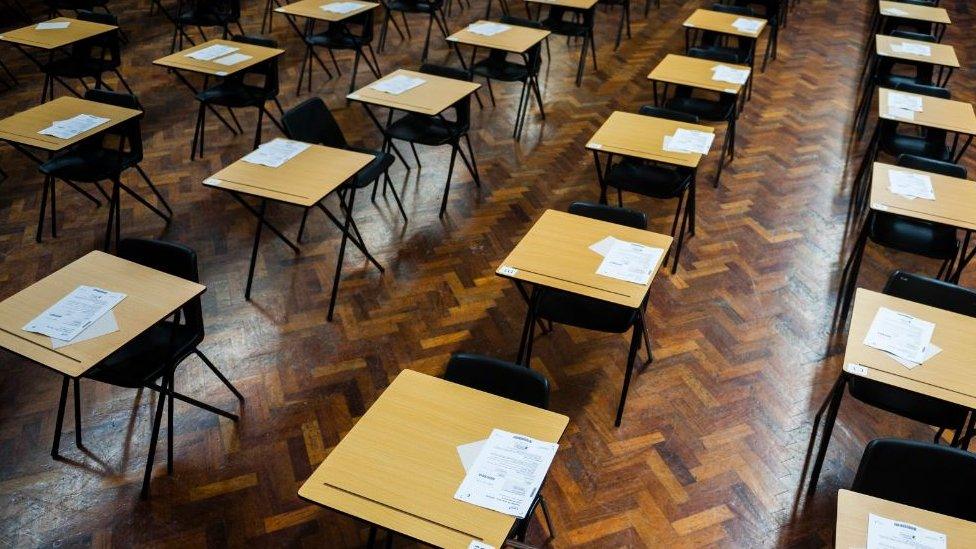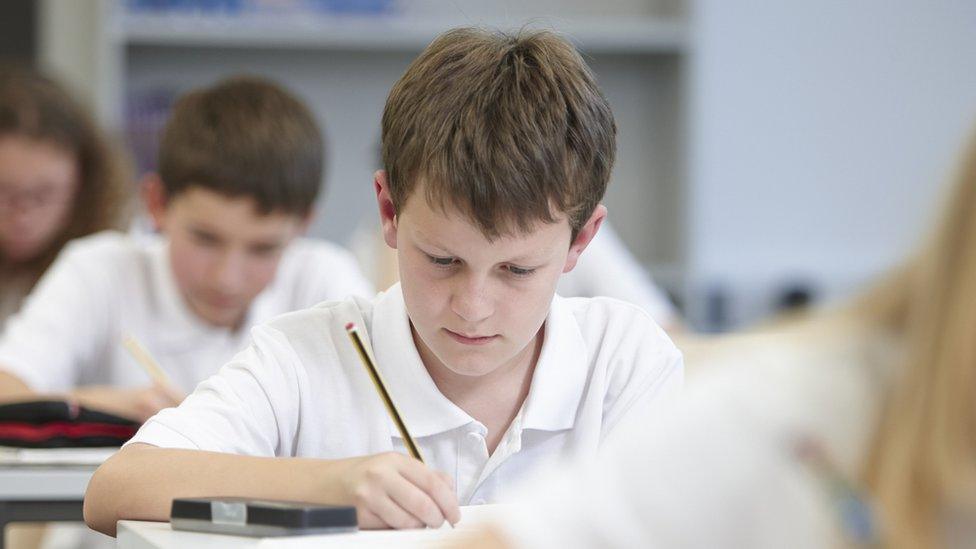Transfer test: More affluent pupils at grammar schools, study finds
- Published

Grammar schools continued to admit many pupils from affluent backgrounds despite the cancellation of transfer tests in 2021.
That is one of the key findings from a new study by the Centre for Research in Educational Underachievement (CREU) at Stranmillis College in Belfast.
It said non-grammars still had more pupils from disadvantaged backgrounds or with special educational needs.
The transfer tests were cancelled in early 2021 due to the Covid pandemic.
"The social composition of grammar schools thus remains very positively skewed towards children from more affluent postcodes," the study said.
"We have a grammar school sector in Northern Ireland which, consistently, has very few children from the most socially deprived areas, very few children entitled to free school meals, very few children with special educational needs and very few newcomer children."
As a result of the disruption caused by Covid, the vast majority of grammar schools - which normally use the tests to admit pupils - used non-academic criteria instead.
A minority of grammars also decided not to use academic selection to admit pupils in 2022.
The Stranmillis study is called Testing Times: Northern Ireland School Transfer Without Tests in 2021.
It looked at what difference the cancellation of the transfer tests, which are run by AQE and PPTC, in 2021 made to grammar schools and the pupils they selected.
Instead of test results, most used criteria based on potential pupils having siblings already at the school, having registered for the transfer tests or going to a nearby primary school.
Of 63 grammars, only three used the results of previous primary school tests in 2021 when deciding which pupils to admit.
Almost no difference
The Stranmillis study analysed what, if any, changes there were in the pupils selected by grammar schools in 2021 compared to other years when the transfer tests took place.
It found that the absence of the tests made almost no difference to the social background of pupils admitted to grammars.

The study found little difference in pupil intake without transfer tests
"If it was indeed the aim of grammar school boards of governors to preserve the essential character of the 2021-22 year eight cohort (in line with previous year eight cohorts), then this aim was met in many respects," the study said.
For example, there was only a slight increase in the proportion of pupils entitled to free school meals admitted to grammars in 2021, and a fall in the proportion of children with special educational needs (SEN).
The study said there continued to be "very stark differences" and a "huge disparity" in the social backgrounds of pupils in grammars and non-grammars.
For instance, about one in six pupils (16%) in grammars in 2021-22 was entitled to free school meals compared with almost four in 10 (39%) in non-grammars.
Just over a quarter of pupils (25.2%) in non-grammars had some form of special educational need, compared to about one in 20 (5.6%) in grammars.
Non-grammars also had many more children from the most disadvantaged backgrounds and newcomer children - those whose first language is not English.
'Heavy lifting'
The authors of the CREU study said its findings raised "fundamental questions regarding the future of a selective education system, which is characterised by such consistently stark differences in the social and demographic background" of pupils.
"It is the non-grammar sector which has to do most of the heavy lifting in terms of meeting the often complex and demanding social and learning needs of a much more diverse cohort of children," it said.
While stopping short of calling for an end to academic selection, the authors said the study's finding should prompt debate about "the future of post-primary transfer in Northern Ireland".
The CREU study was funded by the Nuffield Foundation.
In 2023, a common transfer test run by the grammar schools themselves is due to replace the two separate tests.
That is the biggest change to the post-primary transfer system since 2008 when the state-run 11-plus test ended after about 60 years.
Related topics
- Published22 September 2021

- Published11 November 2022
